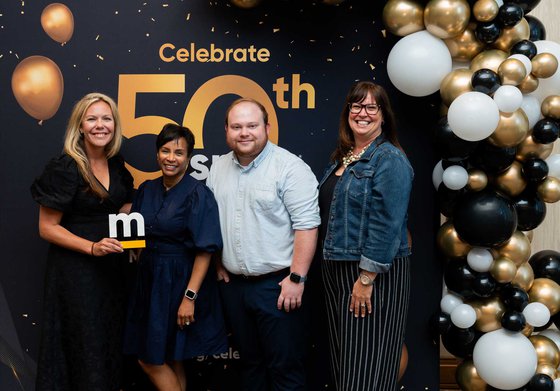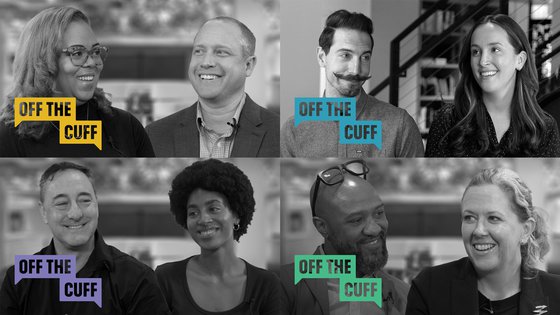newsletter
Sign up for the Marketer QuickLook Newsletter
SMPS Headquarters
625 North Washington Street
Suite 302
Alexandria, VA
22314-1936
email
info@smps.org
phone
703.549.6117



ChatGPT for A/E/C Marketing Teams:
How Firms Can Use
Generative AI
Without Sabotaging Their Business


By By Karl Fedman and Katy Pultz
Feature
Whether the leadership at your firm is aware of it or not, there’s little doubt that some of your team members are using generative AI right now. The technology is just too efficient, practical, and easy to use for anyone to ignore its benefits for writing, graphic design, and other creative tasks in architecture, engineering, or construction (A/E/C) marketing departments.
Nevertheless, with all the advantages that come with generative AI, there’s also the potential for devastating business consequences—especially when A/E/C marketing teams fail to harness the technology in a strategic manner that addresses data security and privacy concerns.
So, how do you use tools like ChatGPT safely and effectively? Let’s take a look at some crucial perspectives to ensure you’re leveraging generative AI strategically and responsibly.
You Still Need a Subject Matter Expert and a Skilled Copywriter
You Still Need a Subject Matter Expert and a Skilled Copywriter
Since the start of 2023, everyone’s getting blasted with the drumbeat of generative AI: “Your content worries are a thing of the past. Just click this button, and our tool will magically generate stunning articles, proposals, and images for you.”
These claims aren’t entirely accurate (yet). While generative AI will definitely speed up the proposal creation and copywriting processes, accuracy and quality are unpredictable—so the technology can be dangerous in the hands of an inexperienced employee.
What’s the key takeaway? Professional copywriters and subject-matter experts are still important pieces of the generative AI equation. For marketing content and proposal writing that works, we still need someone to fact-check the output, perfect the quality, flow, and style of the copy, add additional details; and, in many cases, make significant copy edits or do a complete rewrite for readability and accuracy purposes.
This Is an Opportunity to Distinguish Yourself From the Sea of Beige
This Is an Opportunity to Distinguish Yourself From the Sea of Beige
It’s vital to remember that developers trained systems like ChatGPT and MidJourney on massive datasets harvested from the general internet. These datasets were not comprised of high-quality copywriting entirely. As a result, the output of generative AI is often bland, very difficult to pay attention to, repetitive—and, worse, inaccurate. Relying too heavily on AI means that your marketing team and its messaging will blend into the vast sea of beige that the internet is becoming as a direct result of generative AI.

The output of generative AI is often bland, very difficult to pay attention to, repetitive—and, worse, inaccurate.
Fortunately, A/E/C firms can see this as an opportunity to be the content that exhibits a distinct human touch. When you use AI-generated content as a tool for knowing what’s already been published–and how to make your content more informative and better-written–your proposals and marketing campaigns will leave a more memorable, uniquely relevant impact on audiences, especially when everyone else is rushing to become over-reliant on this technology.
Imagine reading through a stack of AI-written proposals and each one has a conversational and professional but indistinguishable feel. Then you pick up another proposal and there’s an immediate feeling of connection, a familiar sense of human understanding, and more importantly, a discernible level of expertise and unique perspective that was entirely missing from the other proposals. Which proposal is going to win the contract?
What’s the key takeaway? In the coming years, audiences will be starved for content with a human touch. They will be starved for interesting ideas, unique voices, and authentic thought leadership that stands out from that vast sea of AI-written beige. In this respect, make sure that your team uses generative AI in a way that doesn’t sacrifice that human connection and inspires originality that drives successful marketing and proposal writing. If you use generative AI, make sure that your skilled marketers, proposal writers, and artists are putting the human back into your messaging.
Beware of the Google Algorithm (and Other Gatekeepers)
Beware of the Google Algorithm (and Other Gatekeepers)
We suspect that Google will soon adjust its algorithm to detect and downgrade websites using AI-generated content (if they haven’t already). In this respect, you need to make sure that you’re A/E/C firm isn’t shooting its SEO efforts in the foot with this technology. We suggest using a free tool like ZeroGPT or DetectGPT to test all AI-generated content before you publish it.
Interestingly, ChatGPT-written content usually passes the ZeroGPT detector with a score of 75% to 85% human-written, and it wins the score of “human written.” Meanwhile, fully human-written content scores between 95% to 100%. (This article won the 100% human-written score, of course!) Similar applications are evolving and being adapted for other widely used platforms like LinkedIn, which rely on AI to power relevant, valuable recommendations. However, platforms like LinkedIn are incentivized to contain the proliferation of today’s easy-to-use weapons of mass automation.
What’s the key takeaway? AI content detectors are likely to improve—and Google may have already implemented more sophisticated detection technology than we know about. While generative AI will get better at fooling these systems, it’s too risky to take a chance on hurting your SEO efforts–not to mention your authority as an expert. A/E/C marketing teams need to research their audience, develop unique points of view that reflect the firm’s expertise. If you’re distributing AI-generated content to external audiences, you’ll need to test it with a tool like ZeroGPT until the score is close to 0%. Otherwise, your Google rankings, reputation, and new customer acquisition efforts could suffer the consequences.
IMPORTANT: Data Security Is a Serious Concern
IMPORTANT: Data Security Is a Serious Concern
We can’t stress this final point enough. Digital privacy is a significant concern with generative AI. Most generative AI systems are third-party, cloud-based products. Therefore, entering sensitive business secrets or confidential project information into these systems raises serious questions about who will access the data, how it will be used, and whether your valuable IP and sensitive data could be sold or given away to competitors and unauthorized individuals. For government contractors, whose clients have strict and evolving data privacy and security policies, this issue is even more grave. As an example, Samsung recently banned the use of ChatGPT and other AI chatbots after a sensitive code leak.
It’s imperative to ensure the data safety of the systems you choose–and to keep in mind that anything you enter into these systems becomes public domain.
Fortunately, ChatGPT recently announced that it is previewing a version of its platform with additional privacy controls for enterprise customers. In late April 2023, Open AI announced the following in a blog post:
“ChatGPT Business will follow our API’s data usage policies, which means that end users’ data won’t be used to train our models by default. We plan to make ChatGPT Business available in the coming months.”
While this is an encouraging step in the right direction, businesses still need to understand completely the privacy risks of exposing their data to this system. Alternative, data-siloed versions of generative AI are becoming available. For example, Silo AI recently announced its SiloGen product for building data-siloed and secure generative AI systems.
What’s the key takeaway? A/E/C contractors with public clients are bound by especially strict confidentiality and data protection agreements. While you can certainly benefit from the speed of generative AI for proposal writing, it’s imperative to ensure the data safety of the systems you choose–and to keep in mind that anything you enter into these systems becomes public domain. Teams honoring data compliance rules may need to avoid cloud-based AI solutions and choose on-premises, data-siloed alternatives. Also, because individual team members may be tempted to cut corners with unapproved AI in secret, it’s important to develop clear internal policies and rules regarding the use of generative AI technology. Users within A/E/C organizations may not intend to share sensitive information, but it’s exceedingly easy to share information buried under layers of seemingly innocuous content.
Final Thoughts
Final Thoughts
The awe-inspiring capabilities of generative AI systems—like ChatGPT, MidJourney, and Stable Diffusion—become clear after just a few minutes of experimentation. But these capabilities are just the tip of the iceberg.
What will the future be like two years from now? And how will this technology affect workflows for marketing teams in architecture, engineering, and construction (A/E/C) in the years ahead?
We can only speak to what’s available now. Generative AI is still wild and unpredictable and A/E/C teams shouldn’t use it without an experienced marketer, copywriter, and subject-matter expert at the helm. While it is impossible to ignore exploring this “wild Westworld”, leadership at A/E/C firms must keep their eyes on data privacy while setting clear guidelines and policies around the use of this powerful and revolutionary technology.
PS: This article was not written by generative AI.

Karl Feldman is a partner at Hinge, the leading branding and marketing firm for the professional services. Hinge conducts groundbreaking research into high-growth firms and offers a complete suite of services for firms that want to become more visible and grow.
Connect with Karl on
linkedin.com/in/karlfeldman

Katy Pultz, a senior account director at Hinge, manages high-level client relationships and delivers strategic guidance, ensuring Hinge’s research, marketing, and design teams appreciate each client’s unique point of view. She enjoys working closely with senior leadership to develop marketing programs that engage stakeholders at every level.
Connect with Katy on
linkedin.com/in/katypultz
READ NEXT























